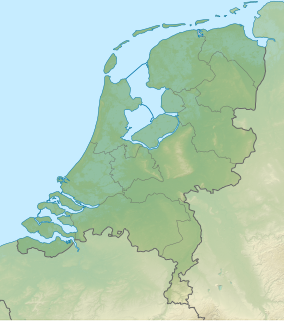
Suriname, officially the Republic of Suriname, is a country in northern South America. Situated slightly north of the equator within the tropics, over 90% of its territory is covered by rainforests, the highest proportion of forest cover in the world. Suriname is bordered by the Atlantic Ocean to the north, French Guiana to the east, Guyana to the west, and Brazil to the south. It is the smallest country in South America by both population and territory, with around 612,985 inhabitants in an area of approximately 163,820 square kilometers. The capital and largest city is Paramaribo, home to roughly half the population.

Drenthe is a province of the Netherlands located in the northeastern part of the country. It is bordered by Overijssel to the south, Friesland to the west, Groningen to the north, and the German state of Lower Saxony to the east. As of November 2019, Drenthe had a population of 493,449 and a total area of 2,680 km2 (1,030 sq mi).
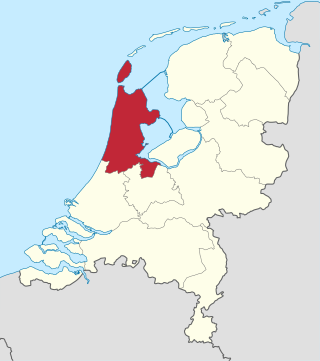
North Holland is a province of the Netherlands in the northwestern part of the country. It is located on the North Sea, north of South Holland and Utrecht, and west of Friesland and Flevoland. In 2023, it had an estimated population of 2,956,223 and a total area of 4,092 km2 (1,580 sq mi), of which 1,430 km2 (550 sq mi) is water.

Bonaire is a Caribbean island in the Leeward Antilles, and is a special municipality of the Netherlands. Its capital is the port of Kralendijk, on the west (leeward) coast of the island. Aruba, Bonaire and Curaçao form the ABC islands, 80 km off the coast of Venezuela. Unlike much of the Caribbean region, the ABC islands lie outside Hurricane Alley. The islands have an arid climate that attracts visitors seeking warm, sunny weather all year round. Bonaire is a popular snorkeling and scuba diving destination because of its multiple shore diving sites and easy access to the island's fringing reefs.

Schouwen-Duiveland is a municipality and an island in the southwestern Netherlands province of Zeeland. The municipality has 33,737 inhabitants and covers an area of 488.94 square kilometres.

The Konik or Polish Konik is a Polish breed of pony. There are semi-feral populations in some regions. They are usually mouse dun or striped dun in color.
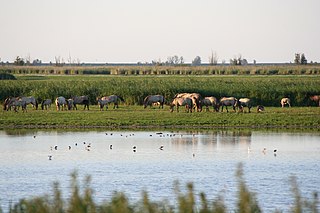
The Oostvaardersplassen is a nature reserve in the Netherlands, managed by the Staatsbosbeheer. Covering about 56 square kilometres (22 sq mi) in the province of Flevoland, it is an experiment in rewilding. It is in a polder created in 1968; by 1989, its ecological interest had resulted in its being declared a Ramsar wetland. It became part of Nieuw Land National Park when that was established in 2018.

The Dutch are an ethnic group native to the Netherlands. They share a common ancestry and culture and speak the Dutch language. Dutch people and their descendants are found in migrant communities worldwide, notably in Aruba, Suriname, Guyana, Curaçao, Argentina, Brazil, Canada, Australia, South Africa, New Zealand and the United States. The Low Countries were situated around the border of France and the Holy Roman Empire, forming a part of their respective peripheries and the various territories of which they consisted had become virtually autonomous by the 13th century. Under the Habsburgs, the Netherlands were organised into a single administrative unit, and in the 16th and 17th centuries the Northern Netherlands gained independence from Spain as the Dutch Republic. The high degree of urbanisation characteristic of Dutch society was attained at a relatively early date. During the Republic the first series of large-scale Dutch migrations outside of Europe took place.
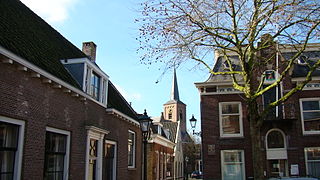
Zwammerdam is a village in the Dutch province of South Holland along Oude Rijn river. It is a part of the municipality of Alphen aan den Rijn, and lies about 6 km southeast of Alphen aan de Rijn. The name derives from a dam built in the Rhine river in 1165 AD by Count Floris III of Holland, to protect the land stream downwards from floods.

Naturalis Biodiversity Center is a national museum of natural history and a research center on biodiversity in Leiden, Netherlands. It was named the European Museum of the Year 2021. Although its current name and organization are relatively recent, the history of Naturalis can be traced back to the early 1800s. Its collection includes approximately 42 million specimens, making it one of the largest natural history collections in the world.

Bellingwolde is a village with a population of 2,655 people in the municipality Westerwolde in the Netherlands. It is situated in the southeast of the region Oldambt, in the north of the region Westerwolde, and in the east of the province Groningen, at the border with Germany.
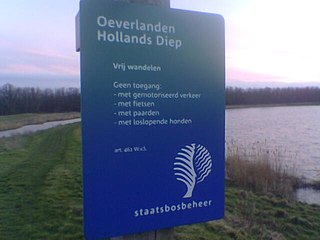
Staatsbosbeheer, founded in 1899, is a Dutch government organization for forestry and the management of nature reserves.

Zuid-Kennemerland National Park is a conservation area on the west coast of the province of North Holland. It was established in 1995.
Vereniging tot Behoud van Natuurmonumenten in Nederland, also known as Vereniging Natuurmonumenten, is a Dutch nature conservation organization founded in 1905 by Jacobus Pieter Thijsse and Eli Heimans, that buys, protects, and manages nature reserves in the Netherlands. It is a member of the European Environmental Bureau.

Bargerveen Nature Reserve is a nature reserve in the Dutch province of Drenthe that has been included in the Natura 2000 ecological network. Since 2006 it is part of the Internationaler Naturpark Bourtanger Moor-Bargerveen, a nature reserve located on both sides of the border between the Netherlands and Germany. Most of the transboundary nature reserve, some 134 km2 (52 sq mi), lies in Germany, in the west of the state of Lower Saxony. The sparsely populated landscape consists of large peat areas, heather, and small lakes.

The Caribbean Netherlands is a geographic region of the Netherlands located outside of Europe, in the Caribbean, consisting of three so-called special municipalities. These are the islands of Bonaire, Sint Eustatius and Saba, as they are also known in legislation, or the BES islands for short. The islands are officially classified as public bodies in the Netherlands and as overseas territories of the European Union; as such, European Union law does not automatically apply to them.

Molenwaard is a former municipality in the western Netherlands, in the southeastern part of the province of South Holland, and the northwestern part of the region of Alblasserwaard. It was the result of a merger of the municipalities of Graafstroom, Liesveld, and Nieuw-Lekkerland on 1 January 2013. On 1 January 2019 it merged with Giessenlanden, together they form the new municipality of Molenlanden. Molenwaard had about 29,000 inhabitants and an area of about 126 km2 (49 sq mi). The largest settlements are Bleskensgraaf, Groot-Ammers, and Nieuw-Lekkerland.

Duivelsberg is a hill and nature reserve in the municipality of Berg en Dal in the Dutch province of Gelderland, near the border with Germany. It is politically significant, however, because Duivelsberg is the only part of the Netherlands that was both annexed from Germany and retained after World War II.
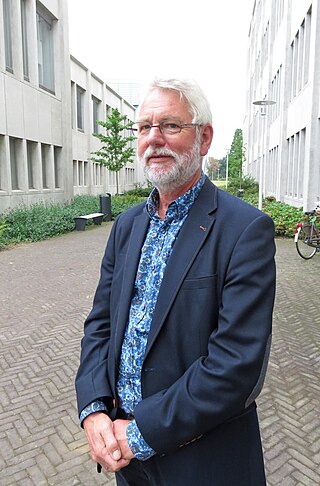
Dr Frans Vera is a Dutch biologist and conservationist. He has played a key part in devising the current ecological strategy for the Netherlands. He has hypothesised that Western European primeval forests at the end of the Pleistocene epoch did not consist only of "closed-canopy" high-forest conditions, but also included pastures combined with forests, a hypothesis variously addressed as the Vera hypothesis or the wood-pasture hypothesis.

Brabants Landschap, officially Stichting het Noordbrabants Landschap, is one of the 12 provincial landscape foundations in the Netherlands.

